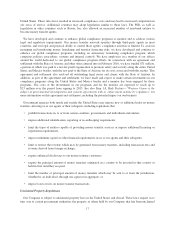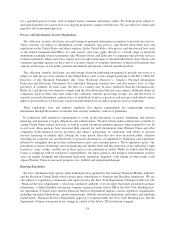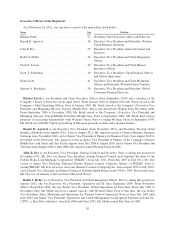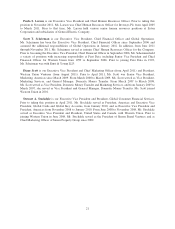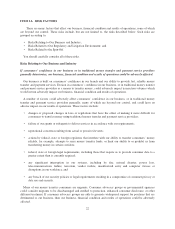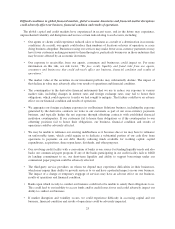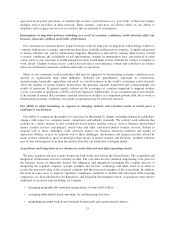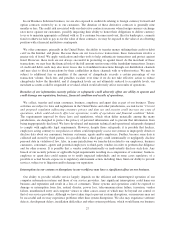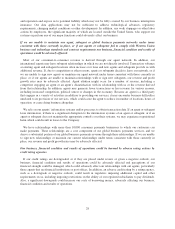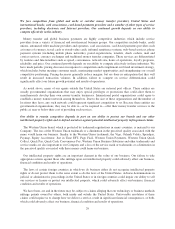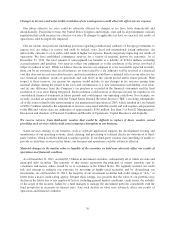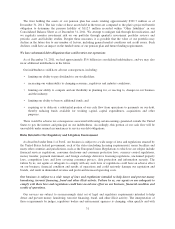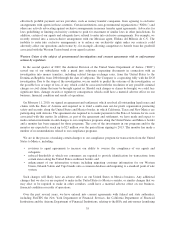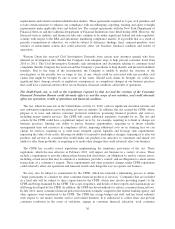Western Union 2011 Annual Report Download - page 33
Download and view the complete annual report
Please find page 33 of the 2011 Western Union annual report below. You can navigate through the pages in the report by either clicking on the pages listed below, or by using the keyword search tool below to find specific information within the annual report.• integrating the acquired technologies into our Company;
• realization of anticipated financial benefits from these acquisitions and where necessary, improving
internal controls of these acquired businesses;
• complying with regulatory requirements;
• fluctuations in currency exchange rates;
• enforcement of intellectual property rights in some foreign countries;
• difficulty entering new markets with the services of the acquired businesses; and
• general economic and political conditions, including legal and other barriers to cross-border investment in
general, or by United States companies in particular.
Integrating operations could cause an interruption of, or divert resources from, one or more of our businesses
and could result in the loss of key personnel. The diversion of management’s attention and any delays or
difficulties encountered in connection with an acquisition and the integration of the acquired company’s
operations could have an adverse effect on our business, financial condition and results of operations.
As of December 31, 2011, we had $3,198.9 million of goodwill comprising approximately 35% of our total
assets. An impairment review of goodwill is conducted at least once a year (including qualitative and quantitative
assessments) to determine whether it is more likely than not that the fair value of a reporting unit is less than its
carrying value. The assessment of goodwill will be performed more frequently than once a year if events or
changes in circumstances indicate that the carrying value of the goodwill may not be recoverable. If we are
unsuccessful in integrating the businesses we have acquired or acquire in the future, or if these acquired
businesses experience declines in operating income or cash flows, adverse changes in the business climate, or if
we are unable to successfully execute our strategy for these businesses, we may be required to write down the
goodwill on our balance sheet associated with these acquisitions, which could have an impact on our financial
condition and results of operations in future periods.
We face credit, liquidity and fraud risks from our agents, consumers and businesses that could adversely
affect our business, financial condition and results of operations.
The vast majority of our global funds transfer business is conducted through third-party agents that provide our
services to consumers at their retail locations. These agents sell our services, collect funds from consumers and
are required to pay the proceeds from these transactions to us. As a result, we have credit exposure to our agents.
In some countries, our agent networks include superagents that establish subagent relationships; these agents
must collect funds from their subagents in order to pay us. We are not insured against credit losses, except in
certain circumstances related to agent theft or fraud. If an agent becomes insolvent, files for bankruptcy, commits
fraud or otherwise fails to pay money order, money transfer or payment services proceeds to us, we must
nonetheless pay the money order, complete the money transfer or payment services on behalf of the consumer.
The liquidity of our agents is necessary for our business to remain strong and to continue to provide our
services. If our agents fail to settle with us in a timely manner, our liquidity could be affected.
From time to time, we have made, and may in the future make, short-term advances and longer term loans to
our agents. These advances and loans generally are secured by settlement funds payable by us to these agents.
However, the failure of these borrowing agents to repay these advances and loans constitutes a credit risk to us.
26



